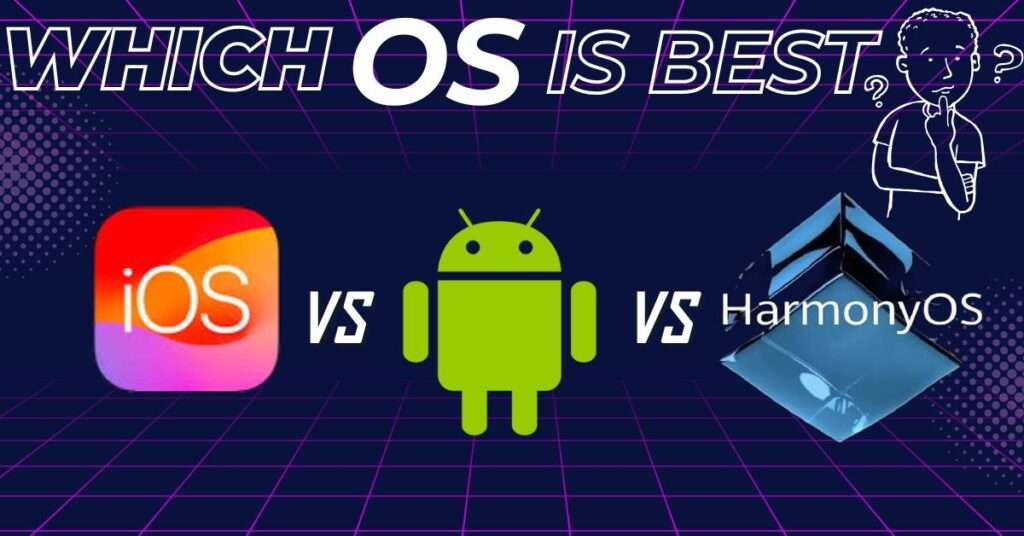iOS vs Android vs Harmonyos : Comparison Which Operating System is Best for You?
In today’s digital age, smartphones have become an integral part of our lives. Be it communication, entertainment, or work, we are dependent on our phones for everything. But the life of smartphones is their operating system, which runs them and gives us a seamless experience.
Operating system is quite crucial because it defines how fast, secure and user-friendly a device will be. iOS, Android, and now HarmonyOS are Three big names in the market which attract users with their unique features. Every system is different and advanced in its own way, but each one has its own target audience.
- iOS: Apple’s premium system known for smooth performance and a closed ecosystem. This is perfect for people who like a high-quality and reliable experience.
- Android: It is an open-source system created by Google which is the most popular and is available on devices of almost every price range across the world. It is famous for customization and flexibility.
- HarmonyOS: Huawei’s new innovation which is specially designed to connect IoT (Internet of Things) devices. These new features and Huawei are creating a distinct identity from the ecosystem.
If you are confused about which operating system will be best for you, then this article will provide you a clear comparison. Let us discuss in detail the key features, pros and cons of Teensy operating systems, so that you can take an informed decision and choose the best option as per your needs.
1. iOS (Apple's Magic System)
iOS was launched by Apple on 9 January 2007. It is made only for Apple devices (iPhone, iPad, etc.). The interface of iOS is very smooth and simple, hence it is very popular among premium users.
IOS Key Points:
- Company: Apple
- File Format: .ipa
- Open Source: No, it is a closed system.
- China Market Share: No. 3 Availability: Global (used all over the world)
IOS Pros & Cons:
Pros:
- Very smooth and user-friendly experience.
- Seamless integration of Apple ecosystem (Mac connects easily with Apple Watch).
Cons:
- Not compatible with non-Apple devices.
- It is expensive and does not fit into everyone’s budget.
2. Android (Everywhere Popular)
Google’s Android was launched on 23 September 2008 and is now the most used operating system in the world. The advantage of being open-source is that every phone manufacturer can customize it.
Android Key Points:
- Company: Google
- File Format: .apk
- Open Source: Yes, available all over the globe.
- China Market Share: No. 1
- Availability: Worldwide
Pros & Cons:
Pros:
- Many other apps are available on Google Play Store.
- It is compatible with phones of every budget.
Cons:
- Due to being open-source, security issues are increasing.
- Having different versions in every device leads to the issue of fragmentation.
3 HarmonyOS (Huawei's new player)
HarmonyOS was launched by Huawei on 22 October 2024. This system has been especially designed for Internet of Things (IoT). expert in connecting smart devices into an ecosystem.
HarmonyOS Key Points:
- Company: Huawei
- File Format: .hap
- Open Source: Yes, available at global level.
- China Market Share: No. 2
- Availability: Currently China-focused, but has chances of going global in the future.
Pros & Cons:
Pros:
- The focus of IoT connectivity is that smart devices are easily connected.
- It is optimized for Huawei devices
Cons:
- Global Adoption is still limited.
- The system is still in its nascent stage, so the features are not as advanced as those in iOS and Android.
Final Verdict: iOS vs Android vs Harmonyos Which Operating System is Best for You?
Now the question arises that which operating system will be best for you among iOS, Android, or HarmonyOS. Every system comes with its own unique qualities and limitations, and your decision will depend on your needs, budget, and preferences. Let us understand in detail which type of user is best fit for which operating system:
1.IOS: Best for premium users
If you want a smooth, reliable and premium experience, then iOS is perfect for you. iOS is part of Apple’s ecosystem, which works seamlessly with devices like MacBook, iPad, Apple Watch. If you already use Apple devices, then iOS becomes a logical choice
This system is ideal for people who give priority to simplicity and performance. But its closed ecosystem and high pricing make it not accessible to anyone. If you want a high-end smartphone experience and want to stay away from compatibility issues, then choosing iOS would be a smart decision.
2. Android: If you like flexibility and customization then this is for you
Android is for those users who want to keep the control of their smartphone in their hands. This is the most popular operating system in the world, which is available on smartphones of every price range. If you want a budget phone or a flagship device, you’ll find no shortage of options in Android.
Its open-source nature gives manufacturers and developers the flexibility to customize the system. Plus, the variety of apps found on the Google Play Store makes Android a strong competitor. But, it is important to consider security issues and fragmentation problems. If you like customization and affordability, then Android is the best option.
3. Hormones: Future-Ready Tech for Enthusiasts
HarmonyOS is still a new player, but it is designed for the integration of IoT (Internet of Things) and smart devices. If you have Huawei devices or want a futuristic ecosystem that can easily integrate with smart TVs, smart homes and wearable devices, then HarmonyOS might be worth considering.
This system is a promising innovation within Huawei’s ecosystem, but its early-stage development and limited global adoption is a challenge. If you are a tech-savvy user and want to explore new technology, then HarmonyOS can be a good choice.
